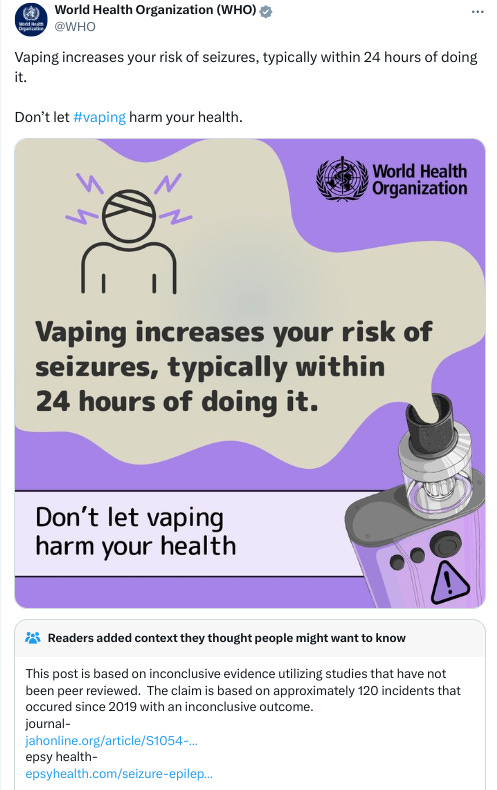April 10, 2024
A note to those who receive the email version of my newsletters: my preview of this is showing links in yellow instead of blue. But if I look at the online version that will be published on my Substack account, the links are the correct color. I can’t find a way to fix this, and I am hoping it is a glitch. If you see links in yellow that are visually challenging for you, you can find the latest edition of this newsletter here: Skip's Corner.
No matter what you call it, not knowing the truth can be detrimental to public health.
Misinformation - infodemic - disinformation - misperceptions
From the WHO in 2024: Disinformation and public health
From the WHO in 2022: Infodemics and misinformation negatively affect people’s health behaviours, new WHO review finds
Yes, please!
WHO should embrace tobacco harm reduction to save lives
“Tobacco harm reduction is integral to the FCTC definition of tobacco control, but it instead emphasises bans, prohibitions, and regulations that undermine access for millions of people to safer alternative products, such as electronic nicotine delivery devices and nicotine pouches. Some of these alternatives have marketing authorisations from the US Food and Drug Administration and the support of governments.”
The public pushes back against the WHO infodemic.
“An “infodemic” refers to the prevalence of misinformation, disinformation, fake news, and conspiracy theories, which potentially deters preventive measures and obstructs the effectiveness of the global management.”
I would like to add propaganda, science with methodological flaws, and half-truths to that list.
Elon Musk’s ‘Community Notes’ are exposing the WHO’s lies
“Continuing attempts to mislead the public (for whatever reason) is unethical and counterproductive for an organization like the WHO, whose supposed mission is to promote global public health based on evidence and scientific consensus.”
WHO Hits New Low With “Vaping Increases Seizure Risk” Tweet
“The WHO has lost its way when it comes to minimizing the harm caused by combustible tobacco, even though it supports harm reduction practices for other substances. Its unbalanced focus on youth and nicotine dependence is contributing to millions of people suffering from smoking-related diseases and premature deaths. It defies belief that the supposed leading authority on global health should be doing this. The world deserves a World Health Organization that tells the truth.”
“A shortcoming of the 2019 study, the editorial said, was that it analyzed seizure 'events' that were self-reported and not always clear.”
Comments on Twitter(X)
There have been a lot of comments about the three WHO tweets that have received Community Notes. Below are a few examples.
“Here WHO goes again. Remember WHO posting: "Fact check: COVID-19 is not airborne?" Now it's "Myth: Vape & heated tobacco products are safer alternatives to cigarettes." WHO friends: You TAUGHT me harm reduction! Have you lost the plot? Stop your misinformation about vaping!” “WHO, when you stated in March 2020 that SARS-CoV-2 was not airborne, you had virtually no data about that. Now, you have MASSIVE amounts of data that vaping -- while not perfectly safe -- is vastly safer than smoking. But you call that fact a MYTH! Lethal risk communication.”
Steve Rolles, Senior Policy Analyst for Transform Drug Policy Foundation:
“I want to be supportive of WHO (they've done a lot of good work on tobacco/alcohol/drugs historically), but their position on vaping is inexplicable & deeply irresponsible; unscientific scaremongering, preferencing smoked tobacco, & abandoning harm reduction pragmatism.”
“Go ahead W.H.O. Make my day. Show us your evidence.”
Phillip Kirschberg, Consumer:
“It grieves me (truly, it does) to inform you that it's time to rectify another fallacious claim from the WHO regarding the use of tobacco #harmreduction products.”
Clive Bates, Director of Counterfactual Consulting:
“Potentially fatal credibility collapse here for WHO. It’s not just that there is no evidence for this causal claim and none is cited. Imagine what it would take to design studies that could show this, even if true.”
Konstantinos Farsalinos, MD, MPH:
“This is the story of an organization that is supposed to represent science but loses all credibility because of an ideological opposition that is based on ZERO SCIENCE.”
Lindsey Stroud, Consumer Advocate, and Senior Fellow at Taxpayers Protection Alliance:
“Just saying, the WHO's anti-tobacco harm reduction policies will start to rub onto everything else the organization touches. If you can't #followthescience when it comes to vaping - how the hell can we trust your guidance when it comes to anything?”
Alex Stevens, University of Kent Professor in Criminal Justice:
“Why is WHO on a mission against vaping, given the potential to massively reduce tobacco-related harm globally?”
Will Truman, Editor-in-Chief of Ordinary Times Magazine and consumer advocate:
“I'm glad I managed to quit smoking before the WHO could talk me out if it.”
Robert Colvile, Director of Centre for Policy Studies, Author, and Editor-in-Chief of CapX:
“You would think this might have been mentioned in the UK govt’s latest 1,500 page report on the health impacts of vaping. It wasn’t. This is pure scaremongering - especially given the awful and absolutely confirmed impacts on health of sucking tar into your lungs.”
Anthony R Cox, Professor in Clinical Pharmacy and Drug Safety at the University of Birmingham:
“This seems a little more moral panic than evidence-based? Speaking as someone who used to get mobbed by vaping fanatics for expressing any mild concern about vaping.”
#DiscomfortOfThought…
“Based on 40+ years of risk communication consulting for corporations, governments, and activist groups, I long ago reached the counterintuitive conclusion that corporate spokespeople are more honest than do-gooders.”
Peter M. Sandman Ph.D. Public Health Tells Noble Lies









Example 4: https://twitter.com/WHOWPRO/status/1777494236801429719